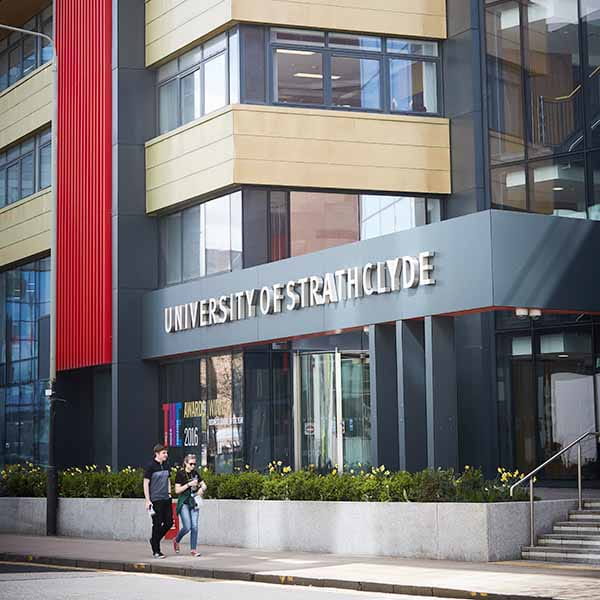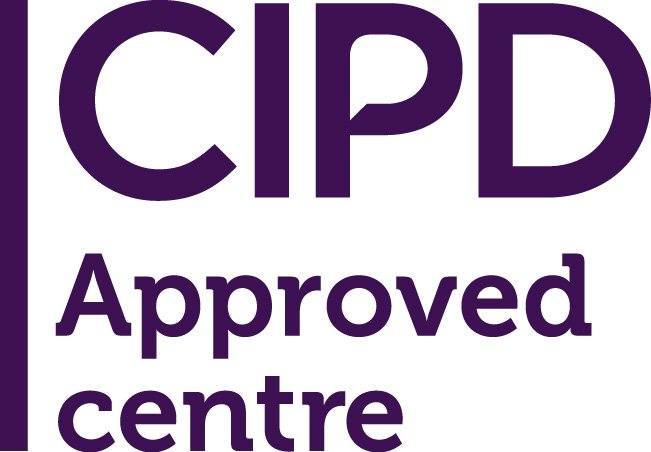MSc/PgDip Human Resource Management (part-time)
ApplyKey facts
- Start date: September
- Accreditation: Professional Membership of the Chartered Institute of Personnel & Development at Associate Member, Chartered Member or Chartered Fellow level
- Study mode and duration: MSc/PgDip: 24 months part-time; MSc (post-diploma): 12 months part-time
Study with us
- two-year, part-time programme
- develop an advanced level of knowledge related to HR
- suitable for HR professionals or line managers with people management within their role
- gain professional membership of the Chartered Institute of Personnel and Development (CIPD)
The Place of Useful Learning
UK University of the Year
Daily Mail University of the Year Awards 2026
Scottish University of the Year
The Sunday Times' Good University Guide 2026
Why this course?
This is a two-year, part-time programme intended for human resource professionals, or line managers with people management or devolved HR responsibilities as part of their role.
Part-time study allows you to learn new skills while continuing to stay in employment and earn a salary. The knowledge and skills gained through your studies can be implemented immediately into the workplace, providing benefits to both you and your employer.
Studying over two years means the pace of study helps you retain a good work-life balance. Teaching is arranged so that you only need to commit to classes one day a week, from 1-7pm.
The aim of this course is to develop an advanced level of knowledge and understanding related to the human resource management function in organisations.
Mixing theory and practice, this programme offers you the opportunity for in-depth study of organisations and the management of work.
You'll have the opportunity to attend guest lectures and tailored seminars delivered by leading HR and business managers, focusing on the practical challenges of managing people in organisations.
The programme is delivered by the Department of Work, Employment & Organisation, winner of the HR Network Award 2018 for Outstanding Contribution to Scottish HR. The department is also home to the highly regarded Scottish Centre for Employment Research.


Through the programme you'll:
You'll be equipped with the skills and knowledge to become a senior people manager with deep knowledge of responsible and sustainable HR practice. Through modules such as ‘Leading, Managing and Developing People’ you'll learn about evidence-based practice in leading and developing employees in a way that delivers engagement and wellbeing for the individual and sustainable success for the organisation.
The programme engages with the transformative potential of AI and digital innovation in the field of people management - and you'll learn directly from senior HR leaders. You'll also learn about how sustainable HRM practice can promote employee engagement and performance while considering organisations’ environmental and social responsibilities.
There's never been a more important time to understand how to manage people and workplaces effectively. HR management skills are crucial in all organisational contexts and in all senior leadership roles. This is particularly the case at a time when AI and automation are transforming organisations and their people management functions.
Through the programme you'll:
- build expertise in the changing world of work and demonstrate an ability to adopt evidence-informed people management practice
- gain an understanding of how ‘people analytics’ can inform better HR management decision making
Our MSc in Human Resource Management benefits from the University’s extensive network of partnerships and you'll engage with live research projects, working closely with organisations to solve real-life HR and workplace challenges.
You'll benefit from learning from – and networking with – senior HR leaders as part of our People Management Masterclass series. Recent keynote speakers include senior people managers at HSBC (Europe’s largest bank) and the NHS (Europe’s largest employer).
You'll gain access to a globally respected qualification, accredited by the Chartered Institute for Personnel and Development (CIPD) and, as a member of the CIPD, join a global network of more than 160,000 HR professionals.
Our programme fosters a culture of critical reflection and collaborative problem-solving. In a rapidly changing and volatile workplace environment, it's crucial that HR managers take bold and ambitious decisions around investing in people.
You'll challenge and re-imagine the underlying assumptions of – and evidence base for – people management practice across organisational contexts. You'll learn how to evaluate the evidence of ‘what works’ in different contexts in terms of fostering employee engagement, wellbeing and performance.
Our ‘Business Skills for HRM’ module will help you to build a business case for investments in progressive workplace practices. You'll be encouraged to be bold in your thinking, ambitious in your goals, and collaborative in your approach.
The MSc has been developed and delivered by academics committed to workplace innovation. Our research and teaching is rooted in real world experience, engaging with organisations as they seek to harness innovation and empower their people to drive transformational change.
You'll also have access to Strathclyde Inspire, a unique sector leading initiative that supports and encourages all forms of entrepreneurship. This initiative will provide you with opportunities to develop an entrepreneurial mindset and an enterprising approach to people management.
What you'll study
You'll take a mix of core and elective classes. Core classes will address topics including understanding the business contexts facing HR Managers and the organisation of HR functions in response to internal and external business factors; current developments in employee relations in the UK; reward management; people resourcing issues; well-being; ethical practice and professionalism in HRM and critical engagement with emerging issues within HRM.
These classes will help you to understand the significance of the management process within organisations; appreciate the importance of human resources in enabling an organisation to meet its corporate objectives; develop a detailed knowledge and understanding relating to the human resource management function and to understand the social, economic, legal, political and commercial environment in which human resource management takes place.
Business Skills will help you develop and improve a range of definable skills that are pivotal to successful management practice and to effective leadership. The module also seeks to develop further more-specialised skills that are of particular significance to effective higher-level people management and provides opportunities for applied learning and continuous professional development.
Management research report
The Diploma stage is completed by submitting a management research report on an HR issue within your place of work. While putting what you've learned into practice on a live HR issue, you're also benefiting your organisation by providing a piece of consultancy work for them backed up by our expert academics.
Integrated dissertation and reflective research report
If you opt to complete the MSc, you'll carry out an integrated dissertation and reflective research report, also based on a live human resources issue normally within your place of work, providing additional consultancy to the organisation in question.
MSc (post-diploma)
If you choose to exit with the Diploma, you're eligible to return and progress to the MSc within five years of graduation. This requires submission of a dissertation on an approved topic along with participation in a series of workshops on research methods.
Chartered Institute of Personnel and Development (CIPD)
The course allows you to work towards a professional level of membership of the Chartered Institute of Personnel and Development (CIPD). CIPD is the professional body for human resource and learning and development professionals. CIPD qualifications are valued by employers and are often a pre-requisite for HR roles. The MSc is an advanced level CIPD accredited programme aligned to the Profession Map standards and meets the educational requirements for Associate Member of CIPD (AssocCIPD). You're required to join the CIPD as a student member at the start of the course and renew your student membership during the academic year.
Accreditation
The Postgraduate Diploma (PgDip) stage of this programme is accredited as meeting the knowledge requirements for Professional Membership of the Chartered Institute of Personnel and Development (CIPD) at Associate Member, Chartered Member or Chartered Fellow level. The Department of Work, Employment & Organisation is a CIPD accredited programme provider.

Strathclyde Business School
Strathclyde Business School was founded in 1948 and is a pioneering, internationally renowned academic organisation with a reputation for research excellence.
One of four faculties forming the University of Strathclyde, SBS is a triple-accredited business school (AACSB, EQUIS and AMBA) and was the first business school in Scotland to achieve this accolade in 2004.
The Business School is home to seven subject departments and a number of specialist centres, all of which collaborate to provide a dynamic, fully-rounded and varied programme of specialist and cross-disciplinary courses.
Strathclyde Inspire
At Strathclyde, we live and breathe entrepreneurship. The University of Strathclyde started life as a place of useful learning, an institution that wanted to make a difference through dong things innovatively, boldly and socially oriented; this founding mission has never been more relevant. Today, we continue to nurture generations of influencers, innovators and industry leaders, empowering our staff, students and alumni to embrace entrepreneurship, transforming their own lives and the lives of others.
Strathclyde Inspire supports and encourages entrepreneurship in all its forms, so whether you want to be more entrepreneurial in your approach to life, business and society, have an idea for a business, or are considering commercialising your research, we will support you at every stage of your journey.
Triple-accredited business school
HRM in a Business Context
The aim of this module is to explore human resource management as both a strategic function and essential aspect of the management role, which creates value for both business organisations and stakeholders through the effective organisation of people and associated work systems. The module examines the business context and socio-economic drivers which shape corporate strategies and in turn, shape the strategic policies and practices of human resource management.
20 credits.
Leading, Managing and Developing People
The aim of the module is to build upon core theories and strategic practices discussed in Semester One HR916 HRM in a Business Context, by critically examining both HRM and HRD practices for building and managing productive, effective, and healthy workers.
This module will utilise a central two-hour lecture to disseminate core knowledge and generate class discussion. On-line learning materials provide links to case studies and tasks which will be discussed in additional 1-hour seminars designed to engage student reflection on the class material.
People Resourcing
The aim of this class is to help students to understand People Resourcing issues within organisations and related concepts in order that they can become thinking practitioners in the field. General knowledge-based objectives include developing knowledge and understanding of a number of issues facing practitioners within organisations who are responsible for ensuring that the organisation is effectively resourced with people.
The learning methods will combine elements of formal presentations, individual reading, group discussions, and class feedback sessions. Learning and development in this class is designed to appeal to a range of learning styles, and to integrate argument, action, and reflection. This means that the format of the learning periods combines lecturing, group work on case studies and discussion.
Employee Reward
This module examines the interdisciplinary nature of reward management in an organisational context, presenting different theoretical and philosophical approaches to pay determination (e.g. economic, psychological, legal, and political) in relation to contemporary trends in employment policy and employee relations.
Reward management strategies that consider relative value, individual and collective contribution and labour markets will be examined. Specific subjects covered within this module include: pay and reward strategies within private, public and third sector organisations; legal constraints in determining pay structures; job analysis techniques; pay differentials for disadvantaged groups; and non-monetary reward. International comparisons will be made available as appropriate.
Learning and development in this class is designed to appeal to a range of learning styles, and to integrate argument, action, and reflection. This means that the format of the learning periods combines lecturing, group work on case studies and discussion. A variety of teaching methods will be adopted including formal lectures, guest lectures, individual reading, and applied exercises including group presentations.
Research Methods
The aim of this class is to help students prepare for undertaking their Integrated Dissertation and Research Report. Sessions covered include research design, ethical consideration in research and analysing and presenting data.
Critical Issues in HRM
The aim of the module is to build upon core theories and strategic practices of HRM by examining emerging developments in people management, within complex and volatile global business environments.
10 credits
Contemporary Employment Relations
The aim of this class is to provide a critical understanding of current developments in employee relations in the UK. It aims to provide a conceptual and theoretical understanding of the dynamics and the contours of the employment relationship. Particular attention will be focused on exploring the resilience of the traditional institutions and modes of employment regulation, as well as exploring current attempts to recast the dynamics of employee relations.
10 credits
Business Skills
This module equips students with essential business skills and competencies aligned with the CIPD Profession Map, preparing them for successful careers in HR. Combining theoretical knowledge with practical application, students will engage in networking opportunities at industry events and develop a reflective portfolio to assess their learning and professional growth. By embedding core HR behaviours and competencies, the module develops employability, continuous professional development and empowers students to drive positive change in the workplace.
Choose one in year 2, semester 2
Labour and Diversity in a Global Context
This module aims to explore causes and patterns of labour mobility in a global context. A key focus will be on the issue of diversity management within and between nation states in an era of more integrated markets and the practical implications these have for managers working in different political and economic contexts.
10 credits
Managing HR in multinationals
This module is primarily focused on human resource management within multinational companies providing a broad base to understand how companies address the challenges of managing globally. The module focuses on key challenges in staffing the multinational enterprise considering aspects such as recruitment and selection, training and development, reward management and performance management.
Intensive classes offered at the Business School’s Spring School
These are a selection of Strathclyde Business School classes that are on offer for the duration of Spring Break that students on the course can select to take.
Please note that classes may differ from year to year depending on what departments have on offer. Find out more about the Spring School here.
Learning & teaching
Core and elective classes will be taught across two semesters each academic year, running from September to December and January to March. Classes will be held one day a week, between 1-7pm. Classes will be taught through a combination of lectures, workshops, interactive sessions, practical demonstrations and role-play. Research reports are submitted toward the end of Year 2.
Assessment
Classes are assessed by various methods, including essays, individual and group projects and final exams. Exams will take place at the end of each semester in December and April/May. You'll also keep a CPD Record that describes all your important learning activities and experiences during the course. Submission of a satisfactory CPD Record is a requirement for completion of the course.
Chat to a student ambassador
Want to know more about what it’s like to be a Strathclyde Business School student at the University of Strathclyde? A selection of our current students are here to help!
Our Unibuddy ambassadors can answer all the questions you may have about their course experiences and studying at Strathclyde, along with offering insight into life in Glasgow and Scotland.
Entry requirements
| Academic requirements/experience | MSc/PgDip MSc (post-diploma) |
|---|

Fees & funding
All fees quoted are for the part-time course and per academic year unless stated otherwise.
Fees may be subject to updates to maintain accuracy. Tuition fees will be notified in your offer letter.
All fees are in £ sterling, unless otherwise stated, and may be subject to revision.
Annual revision of fees
Students on programmes of study of more than one year (or studying standalone modules) should be aware that the majority of fees will increase annually.
The University will take a range of factors into account, including, but not limited to, UK inflation, changes in delivery costs and changes in Scottish and/or UK Government funding. Changes in fees will be published on the University website in October each year for the following year of study and any annual increase will be capped at a maximum of 10% per year. This cap will apply to fees from 2026/27 onwards, which will not increase by more than 10% from the previous year for continuing students.
| Scotland |
|
|---|---|
| England, Wales & Northern Ireland |
|
| Republic of Ireland |
If you are an Irish citizen and have been ordinary resident in the Republic of Ireland for the three years prior to the relevant date, and will be coming to Scotland for Educational purposes only, you will meet the criteria of England, Wales & Northern Ireland fee status. For more information and advice on tuition fee status, you can visit the UKCISA - International student advice and guidance - Scotland: fee status webpage. Find out more about the University of Strathclyde's fee assessments process. |
| International |
|
| Additional costs | Graduation gown hire. Chartered Institute of Personnel and Development Membership PGDip/MSc Human Resource Management and International Human Resource Management is accredited by the Chartered Institute of Personnel and Development (CIPD) and students wishing to achieve Associate Membership of CIPD on completion of the course are required to join as a student member during their studies. This is not mandatory for passing the course but is required by CIPD to achieve membership update on passing the course. The cost for 2022/2023 is a £40 joining fee plus a £98 member fee (dependent on when you join in the year, CIPD offer different membership fee options). Students pay the member fee when they start in September and when they renew their membership fee in July. (information correct 26/04/2021) International studentsInternational students may have associated visa and immigration costs. Please see student visa guidance for more information. |
| Available scholarships | Take a look at our Business School scholarships. |
Please note: the fees shown are annual and may be subject to an increase each year. Find out more about fees.
How can I fund my course?
Scottish postgraduate students
Scottish postgraduate students may be able to apply for support from the Student Awards Agency Scotland (SAAS). The support is in the form of a tuition fee loan and for eligible students, a living cost loan. Find out more about the support and how to apply.
Don’t forget to check our scholarship search for more help with fees and funding.
Students coming from England
Students ordinarily resident in England may be to apply for postgraduate support from Student Finance England. The support is a loan of up to £10,280 which can be used for both tuition fees and living costs. Find out more about the support and how to apply.
Don’t forget to check our scholarship search for more help with fees and funding.
Students coming from Wales
Students ordinarily resident in Wales may be to apply for postgraduate support from Student Finance Wales. The support is a loan of up to £10,280 which can be used for both tuition fees and living costs. Find out more about the support and how to apply.
Don’t forget to check our scholarship search for more help with fees and funding.
Students coming from Northern Ireland
Postgraduate students who are ordinarily resident in Northern Ireland may be able to apply for support from Student Finance Northern Ireland. The support is a tuition fee loan of up to £5,500. Find out more about the support and how to apply.
Don’t forget to check our scholarship search for more help with fees and funding.
Careers
As a CIPD provider for 70 years the Department has an extensive network of alumni in a range of senior HR roles in the private, public and voluntary sectors. More recently, graduates have accessed a range of jobs with a variety of organisations and recent graduate destinations and jobs have included:
- Student Lifecycle Manager, Higher Education
- HR Advisor, Aggreko
- Organisational Development Manager, NHS
- HR Advisor, City Facilities Management Holdings
- HR Manager, Hadden Group
- HR Administrator, Financial Services
- HR Insights Analyst, Financial Services
Glasgow is Scotland's biggest & most cosmopolitan city
Our campus is based right in the very heart of Glasgow. We're in the city centre, next to the Merchant City, both of which are great locations for sightseeing, shopping and socialising alongside your studies.
Apply
For information and guidance on the application process, take a look at our How to Apply web page.
Start date: Sep 2026
Human Resource Management
Start date: Sep 2026
Human Resource Management
Contact us
SBS Postgraduate Admissions
Telephone: +44 (0)141 553 6105 / +44 (0)141 553 6116
Email: sbs.admissions@strath.ac.uk
Strathclyde Business School, University of Strathclyde
199 Cathedral Street
Glasgow
G4 0QU
Have you considered?
We've a range of postgraduate taught and Masters courses similar to this which may also be of interest.




